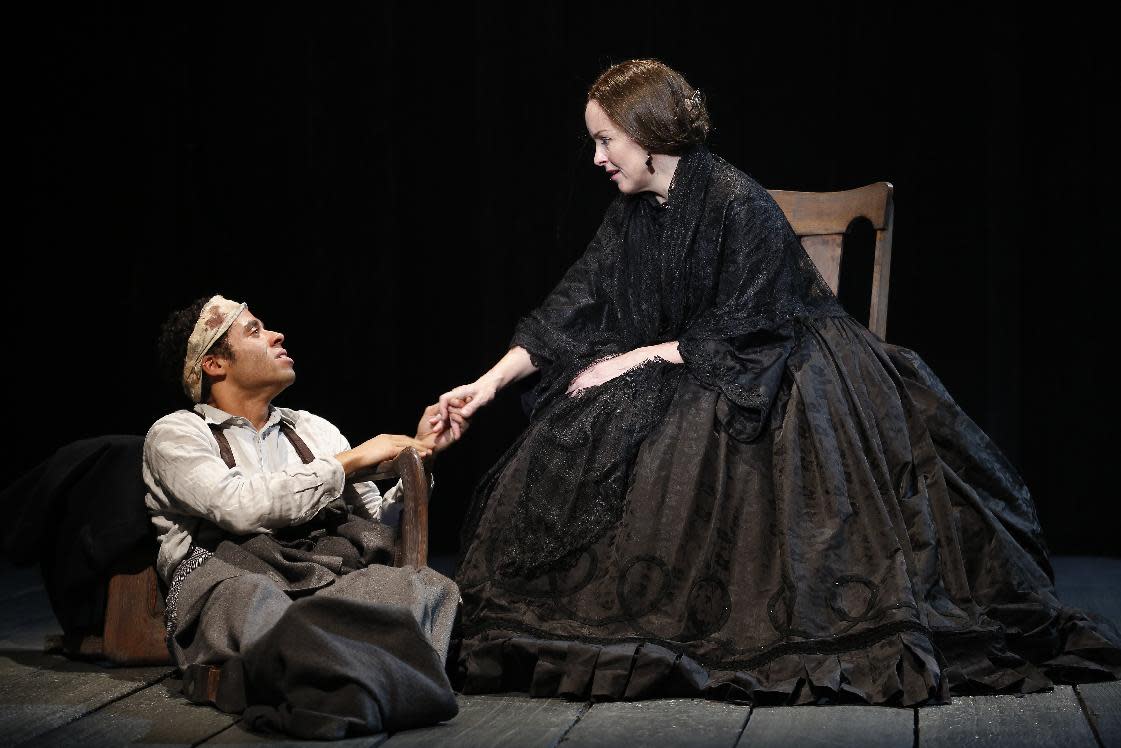Review: 'A Civil War Christmas' is sweeping tale

NEW YORK (AP) — Who knew Abraham Lincoln could play the violin and accordion? In Paula Vogel's warm, non-saccharine vision, the Lincoln character pitches in to do that and more in her sprightly, intellectual musical play, "A Civil War Christmas."
The crazy-quilt production that opened Tuesday night at New York Theatre Workshop is a sweeping, literate and entertaining tale of intersecting spiritual myths and American history on the bitterly cold Christmas Eve of 1864.
Pulitzer Prize-winner Vogel includes racism and prejudice, yet also goodness and tolerance, as a talented ensemble of 11 nimbly sings, dances and enacts multiple characters both historical and fictional. Tina Landau's elegiac direction integrates a multitude of events with a mixture of 19th-century music and Christmas carols.
Landau's creative staging inform affecting vignettes and foreshadowings, as a lost little child, a grieving mother haunted by her dead son's ghost, soldiers on both sides, would-be assassins and a president in peril (Bob Stillman, humorous yet dignified) all appear suspended within the same virtual snow globe.
Lincoln has just been re-elected, and the South has pretty much lost the war, although fighting continues. While the country remains bitterly divided, Vogel focuses on unifying themes that affect all Americans — whether they recognize the truth or not.
The "three wise men" here are Lincoln plus two generals, Ulysses Grant and Robert E. Lee. Among many plot ironies, the victorious Union general Grant is presented as a drunk, while vanquished Lee of the Confederacy is seen nobly refusing to partake of privileges unavailable to his troops.
John Wilkes Booth (Sean Allan Krill, madly histrionic) is earnestly plotting to assassinate Lincoln, while Mary Todd Lincoln (a luminous, delightful Alice Ripley) is trying to tamp down her nervous outbursts while secretly tending to wounded Union soldiers. Lighter motifs include a much-coveted Christmas tree that keeps disappearing.
Karen Kandel is soul-stirringly effective as Elizabeth Keckley, a free-born African-American seamstress who's a friend to Mrs. Lincoln. K. Todd Freeman is fiercely proud as Decatur Bronson, an angry Union sergeant whose wife Rose was stolen two years earlier by retreating Confederates.
Jonathan-David is effective in a number of roles, including a dying soldier and a whimsical turn as a horse called Silver. Rachel Spencer Stewart is determinedly brave as Silver's 13-year-old owner, an unlucky Virginia boy who encounters some mean raiders and an even meaner Union soldier. Sumaya Bouhbal is simply adorable as the lost little girl, Jessa, and Amber Iman is striking as Jessa's desperate mother.
The music includes folk song fragments and a drawn-out, mournful "Silent Night," sung tremulously a capella by Ripley to a dying Jewish soldier, as if Mary Todd Lincoln hoped she could keep him alive as long as the song never ended. Then the chorus joins in, singing the Kaddish, a typical cultural mashup for Vogel.
A couple of wise, recurring sentiments reflect Vogel's realistic optimism: "Share the gladness of your heart" and "The hope of peace may be sweeter than peace itself." For a country still cleaved by politics nearly 150 years after the Civil War, Vogel's focus on decency and commonalities sends a hopeful message.
___
Online:
http://www.nytw.org

